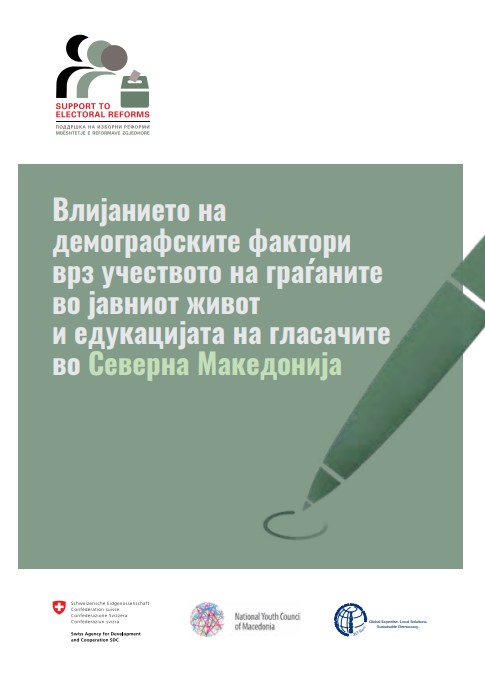The report on the impact of demographic factors on citizen participation in public life and voter education in the North Macedonia is being re-actualized these days before the mayoral elections in the municipalities of Mavrovo and Rostuse and Centar Zupa. Recently, which will be held on April 17.
In addition to the electoral process, this Report is of great importance to the stakeholders involved in civic education and voter education, which aims to strengthen the effectiveness and efficiency of election campaigns. The findings and recommendations of the research aim to raise awareness of the importance of participation in socio-political life and civic activism among the general population, especially among young people, women and people with disabilities, as well as all other vulnerable groups.
The report is a product of the project “Support to Electoral Reforms in Northern Macedonia” and is the result of an in-depth evidence-based survey, which provides data on respondents and provides detailed insights into voter priorities, constraints, and motivational factors for different voter profiles. It contains comprehensive recommendations for each analyzed demographic profile regarding the modalities of civic education, raising awareness of the importance of the electoral process, the choice of media, tools and channels of communication, and the type of messages conveyed.
The sample is designed to accurately reflect the demographic characteristics of the country. Representatives of the ethnic communities of Macedonians, Albanians, Roma, Turks and other communities were interviewed. The qualitative research included 13 focus groups and 4 in-depth interviews with representatives of the following demographic groups: urban population, rural population, women from urban areas, women from rural areas, youth, youth from rural areas, first-time voters, persons with disabilities , people from remote communities, Roma, other ethnic communities, very poor people and the long-term unemployed.
The findings for each demographic group are structured in sections: topics of interest, sources of information, civic participation, election process, communication with candidates and parties, barriers and recommendations.
The final conclusion from the research is that health care (85%) and economic and social stability (82%) are the most important topics of interest for the general population living in the country. Comprehensive analysis shows that taking concrete and pragmatic activities to improve the quality of life is a key motivation for people to become socially and politically active.
The analysis shows that most of the respondents are not interested in more active civic participation, and half of the respondents think that as citizens they cannot have a significant impact in their municipality. Nevertheless, half of the general population is “very” or “less interested” in current socio-political developments in the country and the world. By gender, men are more socially engaged than women.
The Covid-19 pandemic ranks highest among socio-political issues of interest to all demographic groups, but in general citizens are most concerned about issues affecting the quality of life and the immediate environment, such as health care, economic and social stability, local problems, the environment and education.
Only half of the general population state that they vote regularly and that all demographic groups have a general negative perception of voting in elections which, for them, is synonymous with “empty promises”, “bad election campaigns”, “political pressure” and “unnecessary spending money”. The research also shows that different demographic groups are increasingly choosing not to go to the polls due to dissatisfaction with the political parties in the country, which according to them are not interested in responding to the needs of the citizens. Abstaining from voting, according to respondents, is a way of expressing disappointment and revolt against political parties, as well as punishment for unfulfilled promises.
However, the three most important factors that positively affect the turnout of respondents are: the perception that voting is a civil right and duty (56%); Prospects for a better future (42%); and Fear that their voice will be abused (29%). According to the research, the citizens on the candidate lists would like to see more celebrities, young people, representatives of their local community and women.
Television remains the main source of information for almost half of the general population, while social media was pointed out by 14% of the population. It is followed by web portals with 13%, as well as friends and family, which with 8% are pointed out as the main sources of information for the citizens regarding the elections.

